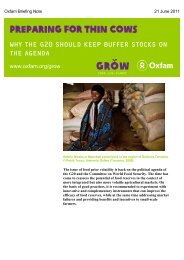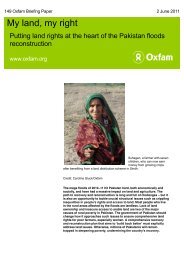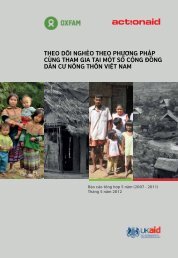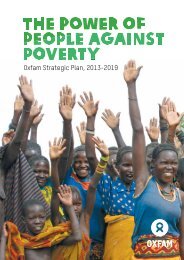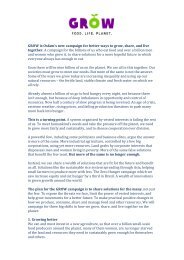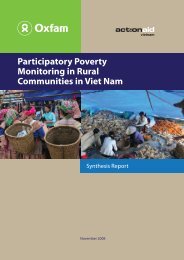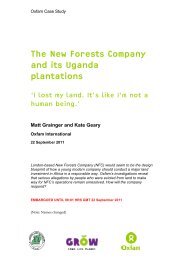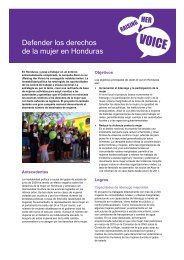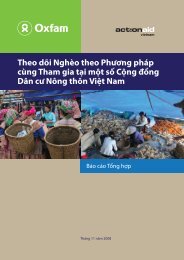Challenges to Rural Poverty Reduction in Viet Nam - Oxfam Blogs
Challenges to Rural Poverty Reduction in Viet Nam - Oxfam Blogs
Challenges to Rural Poverty Reduction in Viet Nam - Oxfam Blogs
You also want an ePaper? Increase the reach of your titles
YUMPU automatically turns print PDFs into web optimized ePapers that Google loves.
Five-year Synthesis Report<br />
Part 2: <strong>Challenges</strong> <strong>to</strong> <strong>Rural</strong> <strong>Poverty</strong> <strong>Reduction</strong> <strong>in</strong> <strong>Viet</strong> <strong>Nam</strong><br />
Duration of work 12 months/year 12 months/year 10-12<br />
months/year<br />
Income<br />
Accommodation<br />
Economic<br />
contribution<br />
5 -7 million<br />
VND/month on<br />
average<br />
Rent a house,<br />
meal on their<br />
own<br />
Sav<strong>in</strong>g of 2 - 3<br />
million VND/<br />
month<br />
2.5 - 3.5 million<br />
VND/month on<br />
average<br />
Rent a house,<br />
meal on their<br />
own<br />
Little sav<strong>in</strong>g,<br />
below 1 million<br />
VND/month,<br />
many don’t have<br />
sav<strong>in</strong>gs.<br />
2.5 - 3<br />
million VND/<br />
month on<br />
average<br />
Covered by<br />
employer<br />
Sav<strong>in</strong>g of<br />
2 - 3 million<br />
VND/month<br />
3-4 months/year<br />
2.5 - 3 million<br />
VND/month on<br />
average<br />
Covered by<br />
employer<br />
Sav<strong>in</strong>g of 2 - 3<br />
million VND/<br />
month<br />
97<br />
Women work<strong>in</strong>g away from home often save and remit more than men. Women<br />
often save and spend less on social network<strong>in</strong>g than men. Men work<strong>in</strong>g away from home<br />
often spend more money on smok<strong>in</strong>g, alcohol, coffee and network<strong>in</strong>g.<br />
Work<strong>in</strong>g away from home can reduce domestic violence. Migrant work reduces the<br />
causes of domestic violence (such as gender biases, paternalism, economic difficulties,<br />
lack of social and legal understand<strong>in</strong>g). Work<strong>in</strong>g away from home provides women with<br />
<strong>in</strong>dependence, so they have a greater role <strong>in</strong> the household, <strong>in</strong>creas<strong>in</strong>g their voice<br />
and position. Work<strong>in</strong>g away from home can also be a solution for victims of domestic<br />
violence.<br />
Work<strong>in</strong>g away from home creates more work for those who stay at home, and<br />
breaks the traditional gender division of labour. When men work away from home,<br />
women do tasks traditionally undertaken by men. Similarly, when women work away from<br />
home men do housework and take care of children. In some low-land villages <strong>in</strong> Thanh<br />
Xuong - Dien Bien and Cu Hue - Dak Lak, young people are work<strong>in</strong>g away from home,<br />
lead<strong>in</strong>g <strong>to</strong> shortage of labour dur<strong>in</strong>g harvest season, so some people from neighbour<strong>in</strong>g<br />
villages come <strong>to</strong> work.<br />
The “re-division of labour” between men and women and the lack of a young<br />
workforce has affected local labour structures. At Duc Huong - Ha T<strong>in</strong>h and Thuan<br />
Hoa - Tra V<strong>in</strong>h, the middle aged do farm and social work as the young tend <strong>to</strong> seek<br />
work elsewhere. The elderly have less support than before, and often have <strong>to</strong> look after<br />
grandchildren. In Duc Huong - Ha T<strong>in</strong>h, many women attend village meet<strong>in</strong>gs (70% or<br />
more) because men are work<strong>in</strong>g away from home. In Thuan Hoa - Tra V<strong>in</strong>h, <strong>in</strong> high<br />
harvest season, it is difficult <strong>to</strong> f<strong>in</strong>d labourers, so wages are often double the normal rate.<br />
Risks faced by migrant workers<br />
In ethnic m<strong>in</strong>ority mounta<strong>in</strong>ous areas, migrant workers face a number of risks.<br />
As migrant workers from ethnic m<strong>in</strong>ority communities don’t have access <strong>to</strong> an extensive<br />
social network or <strong>in</strong>formation as <strong>to</strong> where <strong>to</strong> f<strong>in</strong>d employment many depend on unknown<br />
employment brokers. As a result they often work <strong>in</strong> unsafe conditions, some have been<br />
cheated of their wages, others “sold” for work <strong>in</strong> brothels and even <strong>to</strong> Ch<strong>in</strong>a, and others<br />
work illegally (logg<strong>in</strong>g, for example). Of those able <strong>to</strong> return home, some have had <strong>to</strong><br />
pay a “ransom”. Such experiences naturally discourages others from migrat<strong>in</strong>g <strong>in</strong> search<br />
of work.<br />
People work<strong>in</strong>g away from home <strong>in</strong> the <strong>in</strong>formal sec<strong>to</strong>r do not have access <strong>to</strong><br />
social security. Workers <strong>in</strong> the <strong>in</strong>formal sec<strong>to</strong>r have no contracts, and do not have<br />
access <strong>to</strong> social <strong>in</strong>surance or health <strong>in</strong>surance. Migrants have limited support, and often



